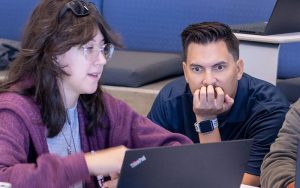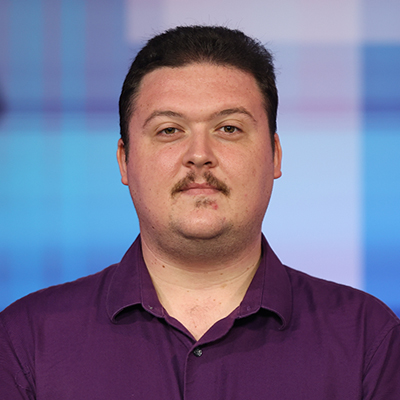
Alec Evans, assistant director of data science for DriveTime, guides Miguel Fernandez, 16, left and Zyron Hilsee, 16, as they work to create a chatbot through Microsoft Azure during the Mark Cuban Foundation AI Boot Camp at the DriveTime corporate office in Tempe. Photo taken Oct. 22, 2022. (Photo by Justin Spangenthal/Cronkite News)
TEMPE – The robots are taking our jobs!
That human fear of artificial intelligence has long been a polarizing topic in U.S. pop and tech culture, politics and even in some academic circles, and it’s growing as AI technology is becoming more prevalent.
AI technology has advanced significantly since its inception in the 1950s. One Arizona company is doing its part to debunk common AI misconceptions by teaching the future generation of AI engineers.
“I think there’s a lot of demystifying we can do about it, like some people call AI a black box, and that’s such a coined term because it’s complex, it’s confusing, and it’s deep in its analytical nature,” said Alec Evans, assistant director of data science for DriveTime, an online used-car dealership and finance company based in Tempe.
In October and November, DriveTime partnered with the Mark Cuban Foundation to host Arizona’s first Mark Cuban Foundation AI Boot Camp for high schoolers.
“And I think what we’re doing with the students here is demystifying that and saying, ‘You use it every day, you see it every day, you just don’t know that that’s what it is,’ can really open students’ minds to this new career opportunity,” Evans said.
AI explained
AI is a blanket term to encompass many innovations like machine learning and natural language processing. However, AI still has boundaries, which make it incapable of many tasks that humans routinely perform.
“The biggest problem comes when there is a mismatch between the capabilities of the actual technology and the perceptions of society. It’s hard to match them, and that creates all the problems,” said Aviral Shrivastava, professor at the Arizona State University School of Computing and Augmented Intelligence.
Society already relies on AI tech. From such virtual assistants as Siri, Google and Alexa to applications like Netflix and YouTube that use machine learning algorithms to recommend content specifically tailored to your interests, AI is part of our everyday lives.
However, much of the AI that is employed by companies goes unnoticed: in banking apps, email and spam filters, autocorrect tools, personalized ads and even thumbnails for videos watched on YouTube.
Chatbots utilize natural language processing to determine and interpret what the user has asked and then tabulates the correct response according to the language it already has processed. Autonomous driving has also made strides.
AI as a career path
DriveTime has been using AI tools and analytics to help ease the customer process of buying a used vehicle, and Evans said they’re at the core of what makes the company different from competitors.
“You’ve got people that are looking for a car first, and you’ve got some people looking for a price first,” he said. “What we want to make sure is that our experience can tailor to both of those shopping experiences.”
Students from across the Phoenix metro were selected for the boot camp, a four-week development program that taught them the basics of AI, machine learning, natural language processing and more. Mark Cuban is a billionaire entrepreneur and the owner of the Dallas Mavericks, and his foundation focuses on providing high school students the opportunity to learn AI and network in the tech space.
The boot camps started in 2019, and this year will reach more than 550 students in 26 U.S. regions – 20 in the Valley – and are hosted by companies that use AI technology. According to the foundation website, the camps allow students to meet employers in the corporate world and connect with adults who have jobs in STEM, AI and machine learning. Students are not required to have coding experience.
https://twitter.com/markcubanai/status/1584981897507409920
Katica Calderon’s father signed the 14-year-old up for the boot camp because of her interest in AI and how it can help others.
“All the knowledge I’ve ever gotten about AI is from my dad,” said Calderon, who hopes to one day work in the field. “He got me an Alexa, so I started researching how it works and I got really interested in that kind of stuff.”
Building networking skills and helping students understand that professions that employ AI technology offer a viable career path is what makes the boot camp so important, said DriveTime’s Robyn Jordan, whose title is head of people.

Katica Calderon, 14, left, and program mentor Matt Abrigo, a senior data analyst for DriveTime, troubleshoot an issue on Microsoft Azure in the Mark Cuban Foundation AI Boot Camp. (Photo by Justin Spangenthal/Cronkite News)
“It’s sort of this new career journey, and it’s where the future is going,” Jordan said, noting that companies should embrace the technology, and education about it should start early. “I think as people start to understand what it can do, and not be afraid of it and adopt it, I think you’ll see more folks trying to figure out how to use it better.”
Robots and your job
A concern that some have with AI tech is that it will make some human jobs obsolete.
Human employees can handle multiple tasks at once and critically think about what they’re doing and why. Although machines can’t think, they can complete mundane, single-minded tasks faster and more efficiently than humans.
“Even when humans do (low-stakes tasks), they are not very perfect at it,” Shrivastava said. “So they also make mistakes, and AI can do a decent enough job, and, in fact, it can do a much better job because it can look at all the parameters systematically and can look at a much larger amount of data than humans would ever have the patience to look at.”
Aside from human error and fatigue, another crucial distinction between machine learning algorithms and humans is that humans are biased and machines are not. Algorithms do not form trends or deduce wrongdoings in data, they simply compute.

Students in the Mark Cuban Foundation AI Boot Camp at the DriveTime corporate office in Tempe learn about natural language processing and how to make chatbots on Microsoft Azure, a public cloud computing platform. Photo taken Oct. 22, 2022. (Photo by Justin Spangenthal/Cronkite News)
“The way the (machine learning) algorithms are designed, they are only reflecting what the data is telling them. So if your data is biased, then your predictions are biased,” Shrivastava said. “Because the algorithms are so effective, we have started using them in places where fairness is an issue. Before this, the standards of algorithms was never an issue – why? Because they were never used in these situations.”
If a company uses an algorithm to determine how much employees should be compensated, the algorithm will rely on previous compensation data, Shrivastava explained. But if the employer has not paid fair wages to a certain employee or group, the AI will continue the negative trend of compensation, appearing to reaffirm the human bias.
Earlier this year, the Forbes Technology Council, an organization of tech executives, compiled a list of 15 jobs and tasks that they expect will be automated within a decade – including data coordination, accounting, driving, simple customer service, sales and marketing – jobs that all have elements at risk.
Although an algorithm may relieve one person’s job of performing a routine task, that algorithm required at least one person to create and shape it. The assimilation and expansion of AI tech does not mean that jobs will be eliminated, but they could be repurposed into better-paying tech jobs.
Evans shared a story of his grandmother telling him she would never want a robot to drive her vehicle.
“But, Grandma, what if you knew that the robot was getting taught to drive by people like me? I’m the one who’s working on those algorithms and teaching it what to do and what not to do.”
